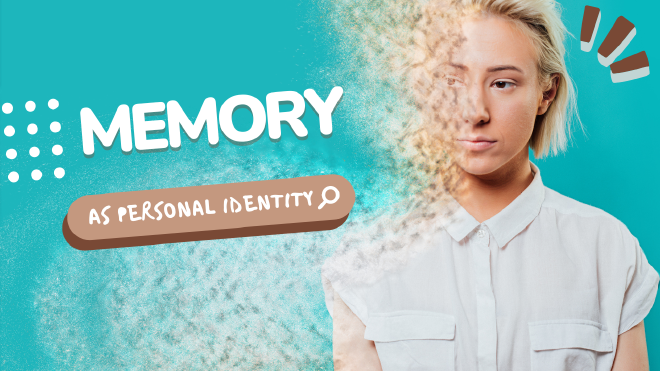Continuity of the Memory as Personal Identity
Table of Contents

Introduction #
Wondering on the concept of personal identity, we immediately think the example of Ship of Theseus as a gedankenexperiment to seek an example. This experiment provides us continuity of function and continuity of parts as a choice to make the distinction of the identity of the ship. In fact, it is the continuity of properties of a substance that helps us root the identity of the ship (metaphysically speaking). Turning to a living person, how will he/she discern his/her identity?
We go with the help of the physical body’s continuity as a basic parameter to recognise the person. It really doesn’t matter if their hair is grown by a millimetre the next day, or if a thousand cells have been replaced in their body from previous day(as if we are capable of perception of such changes), as long as there is a possible continuity of the body, we identify them as the same person. On a subtler and rigorous level, we see to their regular actions and choices-essentially the way their mind works. If a person acts weird the next day, our common usage of language is, “He doesn’t seem normal”, or “He is acting weird” etcetera to denote a change in the continuity of mental status. Dwelling on the mental continuity as the basis for our personal identity we have another issue to address.
Consider a future where swapping memory in floppy disks like the 90s science fiction movies is reality. If we are to reprogram a person’s memories and past choices in a different way, he will act differently. So, it is not wrong to say that a person who holds the true memories or most people is the powerful one in existence. And one example of a society with such elements is the central theme to the popular game by CD Projekt RED, Cyberpunk 2077.
Cyberpunk 2077 #
Cyberpunk 2077 is an action role-playing video game developed by CD Projekt Red, which is based on Mike Pondsmith’s RPG books. An American megacity called Night City belongs in the Free State of North California; corporations control it and is exempt from federal and local regulations. It experiences strife because of raging gang battles and rivalries among its ruling groups for supremacy. For routine tasks like rubbish collection, maintenance, and public transit, the city depends on robotics. Its four historical periods—austere Entropism, colourful Kitsch, imposing Neo-Militarism, and opulent Neo-Kitsch—are the inspiration for its distinctive aesthetic style. Despite the prevalence of homelessness, the impoverished can still undergo cybernetic alteration, which can lead to cosmetic addiction and consequent violence. Because of the constant threat of physical harm, all citizens may carry firearms in public openly. One organisation named Arasaka is of interest here whose involvement in achieving immortality using a Soulkiller project stolen from Alt Cunningham.
Soulkiller is a tech that can read and replicate all the neural connections of the brain and digitally store the “consciousness” of the said person. However, the process has its limitations and one major issue is once the scanning is done, the actual person dies. As part of their “Secure Your Soul” programme, Arasaka intended to use a modified version of the Soulkiller programme to extract the personalities of famous people, influential figures in politics, and other important people to create engrams of those people that could be used for personal gain. The program’s final objective was to send engrams to a host via the Relic. The engram begins to take over the host’s mind and gradually changes their personality to match that of the engram in its current condition when the Relic with an engram on it is placed into another individual. A person’s true personality cannot be determined from their engram because it is devoid of their “soul.” While it is quite similar to the original person—possibly even enough to fool their close relatives—it is not exactly the same. It is merely a shell of their true personality.
The point here is the technology like Relic and Engrams can shape a person’s psyche. In the hands of a scrupulous corporation like Arasaka, who don’t care for ethics of such technology can be a problem to the society. We can always thank the fiction writers and creators to help us take a case study of a utopian, dystopian or a generic scenario in a more clear format. If the plans of Arasaka were to succeed, they will have dominion over the society. Now that is the power one can exercise if the said person holds the memories of people. The continuity of memory definitely acts as a criterion for personal identity.
Gaudiya Vaishnava Vedanta (GVV) Framework on Identity #
The GVV framework, and perhaps most of the other frameworks that has its roots in Vedanta Sutra, supposes the existence of soul and reincarnation. What happens here is that the memories of the past lives are hidden from the current life memories. This is natural by design. It is controlled and relieved on as per need basis only. Most of the time, such relieving is also not done. Hence, the God is given ultimatum towards our memories in this material world. He (no she, sorry folks!) holds the key to our identity since he holds our memories. In fact, in Bhagavad Gita Chapter 15, Text 15, Krishna says he is the one who provides remembrance, forgetfulness and knowledge. If that be the case, and memories form the crucial part of identity, then where is the free will? How can you call free will if you limit a person’s personal identity in the first place? Ain’t the person a prisoner in the hands of the God?
“Your actions are the true statement of your identity.”
Alan C. Fox
There are a multitude of variations of quotes from the same theme about the personal identity. But that is put to a critical question of God, able to control the identity of the person by the sheer force of hiding the memories of a particular person. There are only two logical paths I can consider here. Either the identity should be based on a more fundamental principle than the continuity of the memories or God has seen fit to grant only the semblance of free will. Immediate answer to the above dilemma that every staunch theologian provides is the existence of the soul. This idea has a definite possibility to be real and existent in the eyes of a scientist or a philosopher, but philosophers, especially ontologists, are like Sanskrit Grammarians (SG). The SG prefer to reduce one syllable in their work rather than have a boy child (which is considered being utmost importance to any conservative Indian family and would sacrifice anything to have one), similarly, ontologists wish to keep the list of fundamental ontological ingredients minimum and tidy. However, that is not a strong reason to not accept a new element to their ontologies when compared with fitting the final piece of puzzle., kind of like the Standard Model of Particle Physics. However, the second question poses a threat to all theologians since it questions the existence of free will of an individual and makes many attempts futile in the eyes of the common public. A remarkable oxymoron. We shall explore this issue with both options and see to the depths of what are the tradeoffs and what are the possible pieces of puzzle to puzzle out in later article.
